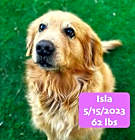When fully grown, Irish Setter are 27 inches tall at the shoulder, while females should measure slightly shorter at 26 inches. Male Irish Setters can weigh between 48 and 88 pounds, while females are smaller. Of course, individual dogs may vary in size, but these ranges give a good idea of the typical size of an Irish Setter.
Irish Setter
Breed Type: Sporting
Common nicknames: Red Dog, Mad Irishman
Coat: Silky
Hypoallergenic: No, they will likely trigger allergies.
Temperament: Friendly, affectionate, patient, energetic
Life expectancy: 12-15 years
Color & patterns: Red

Meet the charismatic and vibrant Irish Setter, a four-legged bundle of energy and affection who will light up your life with their radiant personality. These remarkable dogs are known for being friendly, playful, and outgoing, and they make excellent companions for individuals or families who love an active lifestyle. As intelligent pups, they thrive on mental and physical stimulation and excel at activities such as obedience training and agility. Their keen sense of smell and natural hunting instincts make them excellent scent-detection dogs as well. And let’s not forget their luscious and glossy red coat, which adds to their stunning appearance (but also requires regular grooming).
Irish Setter characteristics
Learn about about Irish Setter basics like their fur colors, shedding levels, how much grooming they need, and other Irish Setter facts.
Average height
25-26 inches (63.5-66.0cm)
Average weight
48-88 pounds (21.8-39.9 kg)
Average lifespan
12-15 years
Exercise needs
Grooming needs
Full-grown size
Good with cats
Good with kids
Training aptitude
Do Irish Setter coats darken with age?
Yes, it’s common for Irish Setter coats to darken as they age. When Irish Setters are puppies, their coats are often lighter in color, and as they reach adulthood, the coat deepens in hue, becoming richer and darker. This darkening process can continue gradually over the first few years of their life. The extent of darkening can vary from dog to dog, but it’s a natural part of the breed’s development.
Can you shave an Irish Setter?
You should not shave an Irish Setter unless there’s a specific medical reason to do so. Here’s why:
Sunburn and Skin Issues: Irish Setters have a double-layered coat that provides insulation from both heat and cold. Shaving them removes this natural protection and puts them at risk of sunburn and skin irritation.
Coat Regrowth: Once shaved, an Irish Setter’s coat may not grow back properly. It could come in unevenly or lose its natural texture and color.
Temperature Regulation: Dogs regulate their body temperature through panting and their coat. Shaving an Irish Setter can interfere with this natural cooling ability, potentially leading to overheating.
If you’re concerned about shedding or coat maintenance, consistent grooming and brushing are much better options. Consult with a professional groomer or vet before making any decisions about shaving your dog so they can give advice based on your pet’s specific needs.
What color are Irish Setters?
Irish Setters have a rich, solid red coat, which can range from a deep mahogany to a lighter chestnut shade. This red coat is the hallmark of the breed and gives them their distinctive appearance. Some Irish Setters may have small patches of white on their chest, paws, throat, or head, but solid red is the preferred and most recognized color for the breed.
Do Irish Terriers shed?
The Irish Terrier sheds very little and when they do, their hair tends to get caught in their coat instead of being released around the house. Their wiry, dense coat doesn’t shed much, but it does require regular grooming to keep it in good condition. Regular brushing helps to manage loose hair and prevent matting, and occasional hand-stripping can maintain the coat’s texture and appearance.
Do Irish Setter dogs shed?
Yes, Irish Setters shed throughout the year, but only moderately, and they have modest grooming needs. Grooming an Irish Setter is pretty straightforward. Their coat consists of fine, silky hair, and grooming can help manage shedding by removing loose hair and preventing mats and tangles. Brushing your Irish Setter’s coat at least twice a week can help minimize loose hair around your home and keep their coat healthy and shiny.
How long does an Irish Setter live?
Irish Setters typically live between 12 to 15 years. However, with any dog breed, individual lifespans can vary based on genetics, overall health, diet, exercise, and quality of care provided throughout their lives. With proper care, attention, and regular veterinary check-ups, Irish Setters can live long and healthy lives.
How many types of Irish Setters are there?
Officially, there is one type of Irish Setter with an established breed standard for coat color, build, temperament, and gait. You may notice some informal variations in individual dogs depending on whether they come from a hunting or show line.
A closely related breed is the Irish Red and White Setter, whose predominantly white coat with deep red patches contrasts with the Irish Setter’s entirely chestnut to mahogany-colored coat.
What age does an Irish Setter stop growing?
Irish Setters stop growing between 12 and 18 months of age. They may also continue to fill out until they are about two to three years old. You can help support the healthy development of your Irish Setter by providing them with proper nutrition, exercise, and vet care throughout their life.
Is a Red Setter the same as an Irish Setter?
Yes, a Red Setter is another name for an Irish Setter. The breed is officially recognized as the Irish Setter, but some folks refer to them as Red Setters if they were bred as field or hunting dogs rather than show dogs. So, when you hear someone mention a Red Setter, they are most likely talking about an Irish Setter.
Irish Setter temperament
Learn about about the Irish Setter temperament and how well they fit into your lifestyle, home environment, and family.
Is an Irish Doodle smart?
Yes, Irish Doodles are very smart. They tend to inherit their intelligence from both the Irish Setter and Poodle, two breeds known for their problem-solving abilities and eagerness to learn. Irish Doodles are quick learners who thrive on mental stimulation, making them responsive to training and new tasks. Their intelligence and friendly and sociable nature also make them excellent at picking up commands and forming strong bonds with their humans.
Are Irish Setters good with kids?
Yes, Irish Setters can be great with kids. They are known for their friendly, outgoing, and affectionate nature, which often makes them great companions for families with kids. Irish Setters are usually patient and tolerant, and they enjoy bonding closely with their family.
As with any dog breed, it’s essential to supervise interactions between Irish Setters and young children to ensure both the dog and the child are comfortable and safe. Teaching children how to properly approach and handle dogs is crucial to ensure positive experiences for both the dog and the child, as is teaching dogs how to interact gently with children.
Are Irish Setters easy to train?
Yes, Irish Setters are easy to train. They are highly intelligent dogs with a playful and exuberant nature. However, that can sometimes lead to distractions during training sessions. It's also worth noting that training any dog takes substantial time and effort, regardless of breed.
Early socialization and positive reinforcement training are crucial for Irish Setters to help them learn good manners and become well-adjusted companions. Using rewards such as toys, treats, and play, and keeping training sessions fun, engaging, and varied will help them stay interested and motivated to learn.
Do Irish Setters bark a lot?
No, Irish Setters aren’t excessive barkers, but they may bark in certain situations, such as when they’re excited, bored, frustrated, or alarmed. Friendly and sociable, they may also vocalize to greet people or other animals. Consistent enrichment, exercise, rest, and reward-based training can help keep barking to a minimum.
Is an Irish Setter a good family dog?
Yes, Irish Setters are excellent family dogs. They are sociable, thrive on consistent attention, and love to be part of the group. It’s important to remember that Irish Setters are also high-energy pups who require plenty of exercise, enrichment, and bonding time. With proper training, socialization, and care, an Irish Setter can make a wonderful and loving family dog.
Are Irish Setters cat-friendly?
Yes, Irish Setters are cat-friendly, especially if they are introduced to them at a young age and raised together in the same household. Of course, each dog (and cat) has their own preferences and personality that can affect how well they get along with each other. When making introductions, it’s important to set the meeting up for success by moving slowly and introducing the pets at a safe and comfortable distance.
Are Irish Setters good with other dogs?
Yes, Irish Setters get along well with other dogs, especially when properly socialized and introduced. As with any breed, individual temperament and personality can vary, so some Irish Setters may be more outgoing and tolerant of other dogs, while others can be more reserved or dog-selective.
Early socialization, starting from puppyhood, is crucial to helping Irish Setters develop good social skills and manners around other dogs. Good experiences with other dogs, supervised playtime, and reward-based training all help foster healthy and safe interactions between dogs.
Are Irish Setters smart?
Yes, Irish Setters are smart pups. They possess good problem-solving abilities and can learn new tasks relatively quickly, especially when training methods are rewarding, consistent, and engaging. Like all breeds, individual Irish Setters may vary in how fast they pick up a new skill. Overall, Irish Setters display an enthusiasm for learning, especially when you teach them skills and cues through fun and interesting games.
Are Irish Setters good guard dogs?
No, Irish Setters are not good guard dogs in the traditional sense. While they may bark to alert their pet parents of strangers or unusual activity, they are generally more inclined to greet newcomers with enthusiasm rather than defensiveness. Additionally, their gentle and outgoing nature often means they are more interested in making friends than guarding property.
Are Irish Setters good for first-time pet parents?
Yes, Irish Setters can be good for first-time pet parents who can commit to meeting their exercise, training, and socialization requirements. There are some considerations to keep in mind:
Exercise Needs: Irish Setters are high-energy dogs who require daily exercise and enrichment. First-time dog parents should be prepared to provide daily walks, playtime, and varied activities to keep their Irish Setter happy and healthy.
Training Requirements: These pups require patience and consistency in training. First-time dog parents should be prepared to put in time and effort into positive reinforcement training and consistent socialization to help their Irish Setter become a well-adjusted canine pal.
Attention and Affection: Irish Setters thrive on attention and affection from their family. First-time dog parents will need to regularly dedicate time to bonding with their Irish Setter and meeting their social and emotional needs.
Grooming: They have a medium-length coat that requires grooming to prevent mats and tangles. Twice weekly brushing and grooming sessions are necessary to keep an Irish Setter’s coat healthy and looking its best.
Irish Setter history
Learn about where this Irish Setter came from!
What were Irish Setters bred for?
Irish Setters were originally bred for bird hunting. Hunters specifically trained them to locate game birds such as grouse, pheasant, and partridge. Their keen sense of smell, agility, and stamina made them excellent hunting companions. Their red coat also made them easy to spot in the field. While they’re still used for hunting today, Irish Setters are also beloved as family pets because of their friendly nature.
Where are Irish Setters from?
Irish Setters hail from Ireland, as their breed name suggests. They have a long history in their homeland, and their ancestry can be traced back to several other breeds, including the Irish Water Spaniel, Irish Terrier, Pointer, and Gordon Setter.
Irish Setter health
Learn about about the Irish Setter health outlook and what diseases they may be prone to at various stages of their life.
Are Irish Setters healthy?
Yes, Irish Setters are overall healthy dogs, but they can be prone to certain health issues. Some of the common health concerns associated with Irish Setters include:
Hip dysplasia: A condition where the hip joint doesn’t develop properly, leading to pain and mobility issues.
Elbow dysplasia: Similar to hip dysplasia, but affecting the elbow joints.
Progressive retinal atrophy (PRA): A group of genetic diseases that cause degeneration of the retina, leading to vision loss and eventual blindness.
Bloat (Gastric dilatation-volvulus): A life-threatening condition where the stomach fills with gas and twists, cutting off blood flow.
Hypothyroidism: A deficiency in thyroid hormone production, which can lead to various health problems.
Cancer: Like many large dog breeds, Irish Setters can be affected by certain types of cancer, especially in their senior years, including pancreatic, skin, and bone cancers.
Providing vet care, a balanced diet, plenty of exercise, and a safe and loving home can help minimize the risk of health issues and promote a long and healthy life for your Irish Setter.
Is an Irish Setter hypoallergenic?
No, Irish Setters are not hypoallergenic. They have a double-layered coat with a soft undercoat and a silky outer coat. While they only shed moderately, their fur still produces dander, which is a common pet allergen.
It’s important to know that no dog breed is entirely hypoallergenic. Some people with allergies may tolerate certain breeds or individual dogs more than others, but there are no guarantees. If you have allergies and are considering getting an Irish Setter or any other breed, it’s best to spend time around them beforehand to see how you react. Additionally, regular grooming and keeping your home clean can help reduce allergens and minimize allergic reactions.
How fast can an Irish Setter run?
Irish Setters can run at impressive speeds of up to 30 miles per hour. Their long legs and lean, muscular build contribute to their speed and agility, allowing Irish Setters to cover ground quickly when they’re on the move. They can excel in a number of fast-paced canine sports such as agility, dock diving, and flyball.
Popular Irish Setter mixes
Breeds that are commonly mixed with Irish Setters include Poodles, Golden Retrievers, and Labradors. Characteristics of an Irish Setter mix can vary widely depending on the specific breeds involved, the individual dog’s genetics, and its upbringing. A few common Irish Setter mixes include:
Irish Doodle (Irish Setter + Poodle)
Golden Irish (Irish Setter + Golden Retriever)
Irish Setter / Labrador Mix (Irish Setter + Labrador)
Irish Setter / Border Collie Mix (Irish Setter + Border Collie)
Irish Setter / German Shepherd Mix (Irish Setter + German Shepherd)

Find Irish Setter puppies near you
Adopting an Irish Setter
We don't see any Irish Setters available for adoption in your exact location or cities near you, but here are some adorable similar breeds in Beverly Hills, CA.

Tucker
Golden Retriever
Male, 6 yrs 1 mo
West Hollywood, CA
Good with dogs
Not good with cats
House-trained
Spayed or Neutered
Shots are up-to-date

Janie
Golden Retriever
Female, 1 yr 9 mos
West Hollywood, CA
Good with dogs
Not good with cats
House-trained
Spayed or Neutered
Shots are up-to-date

Isla
Golden Retriever
Female, 1 yr 11 mos
West Hollywood, CA
Good with dogs
Not good with cats
House-trained
Spayed or Neutered
Shots are up-to-date

Jolene
Golden Retriever
Female, 8 mos
West Hollywood, CA
Not good with dogs
Not good with cats
Spayed or Neutered
Shots are up-to-date

Ben
Golden Retriever
Male, 4 yrs 9 mos
West Hollywood, CA
Good with dogs
Not good with cats
House-trained
Spayed or Neutered
Shots are up-to-date

Hope
Golden Retriever
Female, 1 yr 3 mos
West Hollywood, CA
Good with dogs
Not good with cats
House-trained
Spayed or Neutered
Shots are up-to-date

Frank
Golden Retriever
Male, 2 yrs 10 mos
West Hollywood, CA
Good with dogs
Not good with cats
House-trained
Spayed or Neutered
Shots are up-to-date

Makai
Golden Retriever
Male, adult
Los Angeles, CA
Not good with dogs
Not good with cats
House-trained
Spayed or Neutered
Shots are up-to-date

Tucker
Golden Retriever
Male, 6 yrs 1 mo
West Hollywood, CA
Good with dogs
Not good with cats
House-trained
Spayed or Neutered
Shots are up-to-date

Janie
Golden Retriever
Female, 1 yr 9 mos
West Hollywood, CA
Good with dogs
Not good with cats
House-trained
Spayed or Neutered
Shots are up-to-date

Isla
Golden Retriever
Female, 1 yr 11 mos
West Hollywood, CA
Good with dogs
Not good with cats
House-trained
Spayed or Neutered
Shots are up-to-date

Jolene
Golden Retriever
Female, 8 mos
West Hollywood, CA
Not good with dogs
Not good with cats
Spayed or Neutered
Shots are up-to-date

Ben
Golden Retriever
Male, 4 yrs 9 mos
West Hollywood, CA
Good with dogs
Not good with cats
House-trained
Spayed or Neutered
Shots are up-to-date

Hope
Golden Retriever
Female, 1 yr 3 mos
West Hollywood, CA
Good with dogs
Not good with cats
House-trained
Spayed or Neutered
Shots are up-to-date




